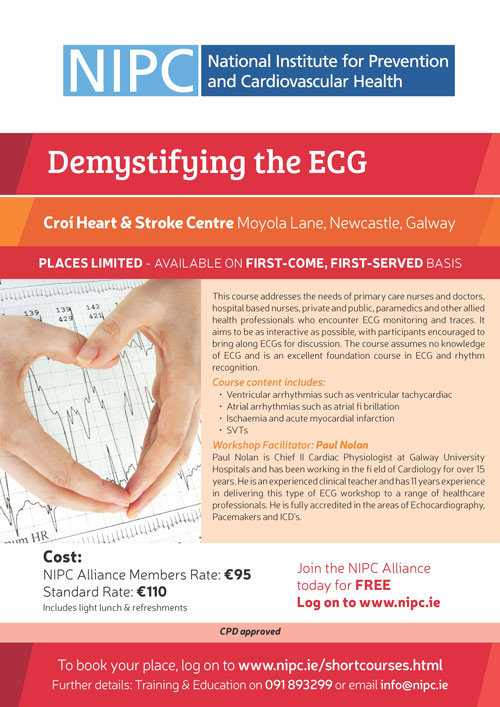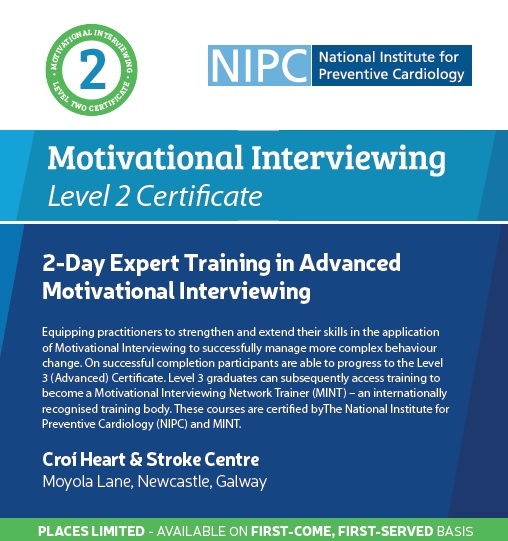Welcome from the Medical & Research Director
The Irish summer is now formally behind us, but there is always hope for a good ol’ “Indian summer”! I recently had the opportunity to attend the European Society of Cardiology meeting in Paris, where it has to be said the weather was delightful.
Major findings reported there related to the use of an antidiabetes medication (dapagliflozin) to successfully treat (and prevent) heart failure even among patients who do not have a diagnosis of diabetes. This is a game-changer and one that has implications for us all and preventive cardiology in particular. Specifically, it reminds us of the importance of preventing and tackling diabetes head on in order to reduce the onslaught of new heart failure diagnoses in our aging population.
Other big news from the ESC meeting included the publication of new cholesterol treatment guidelines that recommended a lower LDL cholesterol target of <1.4 mmol/L for very high risk adults.
In other news, we are now fervently analyzing the iASPIRE data in preparation for the Irish Cardiac Society meeting in Galway in October and the NIPC meeting in Enfield in November. We also had some good news on a couple of other fronts, my colleague Prof David Wood published a review article in The Lancet on the primary prevention of ischemic heart disease that is well worth a read. I did on the plane home from Paris! Furthermore, NIPC was selected for funding from the SlainteCare integration award, which will allow our important myAction programmes to continue running.
Latest News
Which Is Worse for You:
Fat or Sugar?
One day you read that whole-fat dairy products are less likely to contribute to cardiovascular disease than low-fat dairy products. The next day, your doctor tells you fat is unhealthy and recommends a low-fat diet. Then you read that fat isn’t as bad for you as sugar. What are you supposed to believe?
“Both fat and sugar are bad for you,” says preventive cardiology dietitian Kate Patton, RD, LD. “However, we are talking about saturated fats, trans fats and added sugars. This is where some of the confusion lies.” So what’s true?
Primary Prevention of Ischaemic Heart Disease:
Populations, Individuals, & Health Professionals
Ischaemic heart disease continues to be the most important cause of premature mortality and a major cause of disability worldwide. Declining ischaemic heart disease mortality rates in developed countries has largely been due to addressing political, economic, and social determinants, control of major CV risk factors, and improved acute and chronic care. Recent data show that the decline in ischaemic heart disease has stalled and the incidence is increasing in some high income countries.
Pharmacological Lipid-Modification Therapies for Prevention of Ischaemic
Heart Disease
Prevention of ischaemic heart disease requires a multifactorial approach that begins with a healthy lifestyle and control of risk factors, such as blood pressure and lipids. Despite early promise from therapies such as fibrates and nicotinic acid, lipid-modification therapy for the prevention of ischaemic heart disease progressed considerably with the development of statins and the first large cardiovascular outcome trials.
Do Daytime Naps Cut Your Risk of Heart Attack and Stroke?
Taking daytime naps may lower the risk of having a heart attack or stroke, a new study suggests. Napping once to twice weekly for between five minutes and an hour showed an almost halving in heart attack, stroke and heart failure risk compared with those who didn’t nap at all. However, the research, carried out by researchers at the Department of Medicine at the University Hospital of Lausanne, Switzerland, found there was no such association for either more frequent or longer naps.





Recent Comments